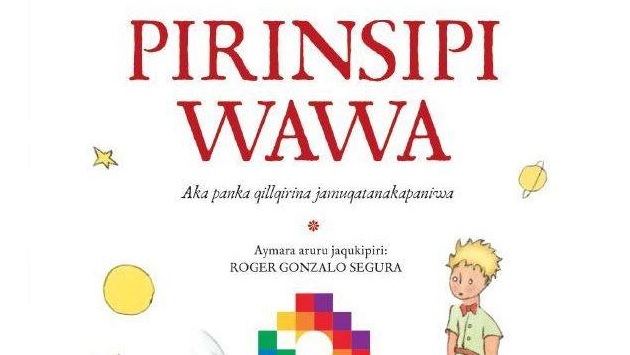Little Prince Can Speak Aymara Now
by Gabriela García Calderón, June 15, 2016.

For the first time, Aymara speakers will be able to enjoy in their native tongue Antoine de Saint-Exupéry’s book “The Little Prince”, the story of the encounter of a pilot whose plane breaks down in the middle of the African desert and a mysterious boy.
According to estimates, Aymara has about 2.2 million speakers who
hail from the Central Andes, in areas of Bolivia, Peru, Chile, and
Argentina. Aymara becomes one of more than 240 languages into which The
Little Prince has been translated since it was originally published in
1943.
The Aymara translation was carried out by college professor Roger Gonzalo Segura:
Bajo el título de “Pirinsipi wawa”, la traducción de esta
novela universal corrió a cargo del profesor de quechua y aymara de la
Pontificia Universidad Católica del Perú (PUCP) Roger Gonzalo, quien
aseguró a Efe que el trabajo le tomó alrededor de dos años.
With the title “Pirinsipi wawa”, the
translation of this universal novel was in charge of Quechua and Aymara
professor from the Pontifical Catholic University of Peru (PUCP) Roger
Gonzalo, who told Efe news agency that the translation took him about
two years [to be completed].
According to Gonzalo, he had no difficulties telling the story within the Aymara world view:
“En el mundo [aymara] tenemos muchísimas historias para
imaginar, incluso asustarnos. Hay animales y seres que no existen y
muchas aventuras”, asegura. No obstante, había elementos del mundo
occidental, como el ferrocarril, que tuvo que refonologizarlos, es
decir, adaptarlos a la gramática de la lengua. En otros casos, no fue
necesario crear nuevas palabras. Por ejemplo, palabras como ‘avión’ y
‘motor’, solo cambiaron a ‘aviona’ y ‘motora’.
“In the [Aymara] world, we have many
stories that make us imagine, or even to be scared of. There are animals
and beings that don’t exist and also many adventures,” Gonzalo notes.
However, there were elements from the Western world, such as railroads,
that we had to rephonologize, that is, that we had to adapt to the
language grammar. In other cases, it wasn’t necessary to create new
words. For instance, words such as ‘airplane’ [avión in Spanish] and
‘motor’, were just changed to ‘aviona’ and ‘motora’.
Gonzalo was born in the community of Chatuma, located in the district of Pomata, in the Punean province of Chucuito. Describing the recently translated book, he said:
Es una obra universal. El mensaje (que puede llegar a las
poblaciones andinas) es la manera cómo una persona puede conceptuar la
vida, explicar las cosas de su alrededor y qué significado pueden tener
para la vida los personajes de El Principito. Estéticamente es
fantástica.
This is a universal book. The message
(that can be conveyed to Andean communities) is the way how someone can
consider life, explain things around them and the meaning this may have
for the life of the characters in The Little Prince. Aesthetically,
it’s fantastic.
On Twitter, you can find images and links related to Gonzalo’s translation and the work behind it:
— elcallejonensintonia (@Calleensintonia) 9 de mayo de 2016
The Little Prince can now be read in Aymara language.
Quechua and Aymara languages professor, Roger Gonzalo Segura, was in charge of the translation.
Un profesor peruano tradujo “El Principito” al aymara – Nodal Cultura – https://t.co/ZIvSP3B00z
— miriam sofia sassone (@sofiasassone) 8 de mayo de 2016
Peruvian professor translated The Little Prince into Aymara.
“El Principito” fue traducido al aymara. ¿Cuánto tiempo duró este trabajo? Te lo contamos ►https://t.co/znRmqcLvyn pic.twitter.com/WBZ4mhmF63— CORAPE (@corapesatelital) 6 de mayo de 2016
The Little Prince was translated into Aymara. How long did this work take? We tell you about it.
‘Pirinsipi Wawa – El Principito’ es traducido al aymara https://t.co/TE2bdLFV4b #Aymara pic.twitter.com/zFmzvdHYPl
— Bolivia informa (@Bolivia_informa) 9 de mayo de 2016
Prinsipi Wawa – The Little Prince translated into Aymara.
Professor Gonzalo is also a speaker of Quechua,
a language family spoken in the Central Andes with over 10 million
speakers. Besides his work as translator of The Little Prince, he is in
charge of Quechua Rimarina, a program broadcast on a university YouTube channel that teaches Quechua.
SOURCE: Global voices


